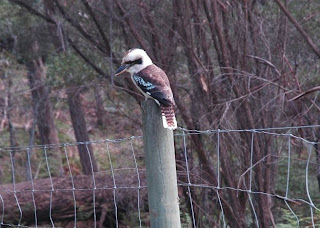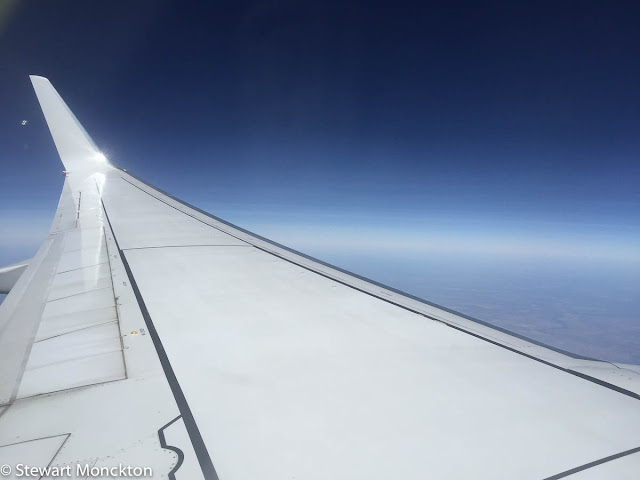Grampians - Soundscape.

No matter where you are going, or how you plan to get there, you always pass through the same small town, although sometimes it’s a village or even a suburb. It’s called “If you have forgotten something it’s too late to turn back now”. It’s twinned with that other place called “Did you lock the back door?”, and both are vital locations on any journey. We had passed the “it’s too late to turn back” point at least an hour before when I realized I had left my binoculars in the study.
In my own car this would have been no problem, but we were not in my car. I carry a pair of binoculars, hidden, Jason Bourne style, under the front seat for bird watching emergencies, for rarities on the by-pass, passage migrants on the journey home. “Oh dear!” to say the least.
But it made me do something different, something not always to the fore. It made me listen. Now I always listen, who can stop? (Well my kids seem to be able to stop and start at will, but that’s a different issue!) But this seemed different, more intense, more vital somehow. It was as if I had a greater access to the soundscape of the place I was in. It was as if I was listening in a different way. Rather than being a pointer to something I would look at, sound became a focal point (if that’s the appropriate phrase) in itself, a way to know I was somewhere different. A way to define where I actually was.
The soundscape of a place can sink into the background of your perception, so that you only notice a difference when it stops altogether or the change is gross and unmissable. As a kid I could wake up some days and know, without having to bother to look, that the world would be blanketed in snow, or that the promised snow had failed to arrive. Snow brought with it a soundscape like no other, a deeper silence than anything else, a sort of muffled hush that was beyond normal, beyond those short fragments of time when everything stops, for an instance, before pushing onwards. It was not a silence that was forced, not a church kind of silence where you can feel noise under the surface trying to escape, but a simple reality, with no resistance to the change it brought.
The evening soundscape of where I live is a strange mix, almost emblematic of what Australia once wanted to be and what it actually is. You get a mix of the mellow organ trills of Australian Magpies, the rattle squawk of Wattle Birds and the song of Blackbirds. The native and the introduced, the real and the imagined. Blackbirds cause a good deal of trouble in my head, so very familiar as they try, and try again, to be more imaginative, more fluent than Song Thrushes. They always fail. But they never fail to take me back to where I am from. Blackbird song in a spring evening is a kind of homecoming, a sound which is both difficult and wonderful at the same time. A here and there in the closing of the day.
As I got out of the car in Halls Gap, visitor central for the Grampians, I was immersed in a set of sounds different from usual. The background squeal of tram wheels on tram tracks, the buzz of cars, the flat whine of lawn mower engines – surely the anthem of suburbia – was gone, replaced by a different set of sounds. Each sound blended together in way that seemed new, even though I had been here before, stayed in this very house, at this time of year, for the last 4 years. Was I already listening, when in the past I would have been looking?
That night, as I collected logs for the fire, I heard a coarse call, plaintive, repetitive and unknown. The source remained hidden that night, although a glimpse of something flying through the night’s sky suggested it was a bird. The next night armed with a torch I heard the call and found the bird, an owl, probably a young Southern Boobook, calling for food. Being “armed with a torch” may not seem to be the thing to do if you are intent on listening. But I actually found the bird (more or less) before I saw it. By standing still and just listening I was able to pin down the source to a few branches, silhouetted against the clear sky. The torch just let me get down to the actual branch, and did not reveal much more detail. Much later that night I woke to hear the call of the adult and a distant reply, owl conversation.
By the end of the second or third day the sounds had become familiar. The squeak wail of the Corella’s was a near constant, sometimes loud and overhead, sometimes faint and distant. The whistled bell chime of Crimson Rosella’s clear and far carrying, often accompanied by a flash of colour, reds, yellows and blue. The bursts of laughter from Kookaburra’s prompting a echo in my kids. The creaky-gate call of Gang-Gang Cockatoo, males grey and red and in need of oiling.
Each of these would have been a punctuation in my normal soundscape, a reason to stop and pause, but here they became wonderfully normal. But the falling call of Horsfields’s Bronze-Cuckoo was enough to stop me in my tracks, unheard at home and different enough to punch through the background here. A delight in difference.
Each of these would have been a punctuation in my normal soundscape, a reason to stop and pause, but here they became wonderfully normal. But the falling call of Horsfields’s Bronze-Cuckoo was enough to stop me in my tracks, unheard at home and different enough to punch through the background here. A delight in difference.

It’s hard not to add a personality to the sounds you hear, the sad sounding owl begging for food, the comical kookaburra. The Australian Raven, not a bird of death as elsewhere, voices disapproval when disturbed, offers criticism of our every move – it would do well in some work places I know – and flies off with heavy wings, pushing air towards us, offers sounds to be heard.



Comments